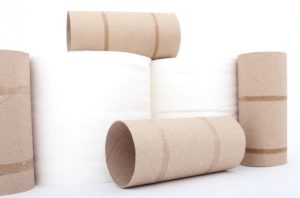
Coronavirus is moving fast. Alongside surges in the numbers of detected cases, and calls for lockdowns in cities across the world, supermarkets in the UK are currently facing panic buying on an unprecedented scale.
Alongside mass-sales of hand sanitisers and soap, packs of toilet roll have been flying off the shelves of British supermarkets, too. But, while stockpiling soaps and sanitisers has been rightly condemned - as a sales-trend which could have serious consequences for those who need that soap the most - the sales in loo roll have been laughed off by many, as simply ridiculous. 
Ebay auctions which have seen packs of 72 rolls of Andrex flogged at over £50 a pop are certainly laughable, but the sinister consequences of this sales trend are nothing to scoff at. It could well spell disaster for our sewers.
How?
Feeding Fatbergs
While toilet rolls are designed to break down in our sewers, and so ensure that our waste water continues to run smoothly, the shortage of loo roll is already driving Brits onto the alternatives – which are not so sewer-friendly.
Already, people are resorting to kitchen roll, tissues and the dreaded wet wipe – but sending any of these down your drains could help to feed a blockage.
Wet wipes in particular have long been known to help fatbergs grow much faster than they would otherwise. Failing to break down, they remain as solid matter around which fat, oil and grease waste accumulates, clumping together, solidifying and snowballing into fatbergs over time.
Those fatbergs then block sewers, making sewer overflows more likely. Sewer overflows, in turn, send raw sewage straight into our waterways - damaging habitats and, eventually, threatening our health.

Soap, undiluted and unused, which makes it down our drains and into our sewers can act as a glue, sticking clumps of FOG waste together and helping fatbergs to grow that little bit faster. The lesson we need to learn: Use soap, and wash your hands for 20 seconds, but don’t use more than you need – don’t send an excess down our drains.
Now, more than ever, our sewers need our help:
We Are About to See a Significant Shift in the Fatberg Problem
The volume of FOG (fats, oils and grease) waste being sent into sewers looks set to rise.
Water companies have been attempting to raise awareness about the fatberg problem for many years now. With the threat of fines, they have been hard at work persuading food businesses to follow good grease management protocols and to install and maintain high quality grease traps to deal with their FOG output.
Food businesses were the right focus for those awareness campaigns when they were being run: in normal circumstances, fast food joints, restaurants, pubs, bars and cafes, which prepare huge numbers of meals a day, are undeniably the biggest contributors to the FOG problem.
But these are not normal circumstances: the coronavirus pandemic is about to bring about a significant shift in who is responsible for the FOG problem. With food businesses across the country set to close, they won’t be emitting any more fats, oils and grease. Households will overtake them.
Households have, for a long time, been major contributors to the fatberg problem – but the collective impact of our households has for a long time taken a second place behind public eating places. But, as the entire population stays at home, preparing all meals in domestic kitchens, the shift could spell disaster for our sewers. 
For starters, most members of the public have little awareness of the fatberg problem - most of those who don’t spend their time trawling through FOG news, don’t know the consequences of sending old cooking oil straight down their drains.
Even for those who do know, and do want to do something to stop the formation of fatbergs in our sewers, it can be difficult to do something about it. Usually, unless your local authority runs a grease-disposal service, to get rid of household FOG, you’ve got to save it up until you’re able to drive it to your local waste treatment centre and drop it off. With a pandemic restricting movement to the essentials, it may be months before anyone is able to make those trips.
As a result: it’s likely many will end up taking the easy option - sending that cooking oil straight down the sink.
At a time when home-fried comfort foods are likely to become ever more common in household kitchens across the country, we Brits are set to give fatbergs an unprecedented helping hand.
Find out more about fatbergs - what are they and what are they made of in Anatomy of a Fatberg.
Water Companies Have their Work Cut Out

But 2020 is not a normal year. With the population panicking, water companies will have a gargantuan task to deal with over the next few months, just to keep our sewers running as they were.
Britain’s newfound buying habits are a large part of the problem. With shortages in face masks making the work of water company fatberg removal crews that bit less safe, they’ll also be contending with a flood of FOG waste down our drains, compounded by toilet paper alternatives and an excess of gluey soap residues.
Water companies will struggle to keep us safe, and to keep our sewer systems running smoothly.
You Can Help
Stay safe and stay self-isolated but, when you need to make a run to the shops for the essentials, keep calm and buy only what you need, be mindful of fats, oils and grease going down your kitchen sink and only flush the 3 P's down the toilet. Our sewers are relying on you.

Leave a Comment
Your email address will not be published. Required fields are marked *